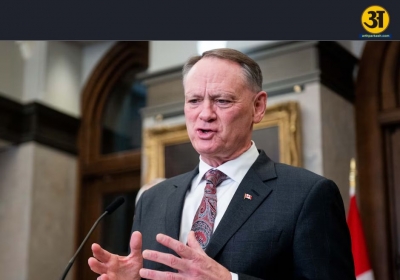
China pledged closer cooperation with Pakistan under the USD 60 billion CPEC
China promised stronger cooperation with Pakistan
As Prime Minister Imran Khan met with top Chinese leadership, including President Xi Jinping, on Sunday, China pledged closer cooperation with Pakistan under the USD 60 billion CPEC investment program and called for resolving the Kashmir issue properly and peacefully while opposing any "unilateral actions" that could complicate the situation. On the final day of his four-day visit to China, Khan met with President Xi to discuss a variety of issues, including the slow progress of the China-Pakistan Economic Corridor (CPEC) and Beijing's growing concerns about recurring attacks on Chinese personnel working on its various projects in Pakistan.
During his discussion with Khan, Xi stated that China is committed to Pakistan's national independence, sovereignty, and dignity, as well as its battle against terrorism, according to the state-run Xinhua news agency. He stated that China is eager to work with Pakistan to advance the CPEC's in-depth development and assure the completion of key projects.
"Both sides reiterated that a peaceful and prosperous South Asia is in the common interest of all parties,” Khan's travel to China to attend the opening ceremony of the Beijing Winter Olympics ended with a joint statement.
It says, "They emphasised the importance of pursuit of dialogue and resolution of all outstanding disputes to promote regional cooperation and advance the goals of lasting peace, stability and shared prosperity in the region.”
"The Pakistan side briefed the Chinese side on the latest developments on the situation in Jammu & Kashmir, including its concerns, position and pressing issues at the moment. The Chinese side reiterated that the Kashmir issue was a dispute left from history, and should be properly and peacefully resolved based on the UN Charter, relevant Security Council resolutions, and bilateral agreements. China opposes any unilateral actions that complicate the situation,” it further said.
In the past, India has vehemently denied any reference to Jammu and Kashmir in a joint statement issued by Pakistan and China, asserting that the union territory, as well as Ladakh, have been and would continue to be an integral and inalienable part of the country.
In July 2021, Arindam Bagchi, a spokeswoman for the External Affairs Ministry, protested to a mention of the so-called China-Pakistan Economic Corridor in a joint statement by the two nations, claiming that it is in Indian territory that Pakistan has illegally acquired.
"As in the past, India categorically rejects any reference to Jammu and Kashmir. The union territory of Jammu and Kashmir and the union territory of Ladakh has been and will remain an integral and inalienable part of India," Bagchi said.
"We resolutely oppose any attempts by other countries to change the status quo in areas illegally occupied by Pakistan as also to Pakistan bringing up any material change in Indian territories under its illegal occupation. We call upon parties concerned to cease such actions." According to the spokesperson, India has continuously communicated to both China and Pakistan that the so-called CPEC is located on Indian soil.
China acknowledged Pakistan's sacrifices and efforts in the battle against terrorism, according to the joint statement, and both sides reiterated their commitment to fighting terrorism in all its forms and manifestations.
It also said, "both sides agreed to continue the momentum in defence cooperation at various levels between the armed forces of Pakistan and China.” China has surpassed the United States as Pakistan's largest supplier of armaments, including combat tanks, fighter jets, and the most modern naval frigates.
"They underscored that stronger defence and security cooperation between Pakistan and China was an important factor of peace and stability in the region,” it also said.
While advocating for "firmer confidence" in China-Pakistan relations, Xi stated that the "strategic significance" of all-weather relationships is "becoming more obvious" as the two nations sign many agreements to strengthen all-weather ties. "Both sides expressed their strong determination to safeguard CPEC from all threats and malicious propaganda," according to the joint statement.
Pakistan reaffirmed its willingness to go to great lengths to ensure the safety of all Chinese employees, projects, and institutions in Pakistan, and the Chinese side praised Pakistan's efforts.
In the wake of many attacks on Pakistani workers working on the CPEC, China has repeatedly urged Pakistan to beef up security for thousands of its employees. Khan lauded China's leadership for hosting the Winter Olympics, which the US and its allies boycotted due to human rights atrocities against Uygur Muslims in Xinjiang.
The two sides signed a slew of memorandums of understanding (MoUs) to coincide with his visit, covering bilateral cooperation in economic and technical, industry, investment, infrastructure, space, vaccine, digitalization, standardization, disaster management, culture, sports, and vocational education, according to the joint statement.
According to China's envoy to Islamabad, Nong Rong, the new Framework Agreement on Industrial Cooperation to commence development of the second phase of the CPEC, in which China has already invested roughly USD 25 billion, was the most prominent of these agreements whose specifics were not published.
Xi urged on the two sides to "build a better future for bilateral ties with firmer confidence" during his meeting with Khan, according to the state-run Xinhua news agency. He didn't go into detail.
“the two sides are ready to discuss with Afghanistan the extension of the CPEC to Afghanistan,” the joint statement said.
Xi expressed China's willingness to work with Pakistan to expand cooperation in areas such as science and technology, agriculture, and people's well-being, as well as to build a green, healthy, and digital corridor and support Pakistan's industrialization in order to improve the country's ability to achieve sustainable development.
Xi expressed China's willingness to work with Pakistan in areas such as science and technology, agriculture, and people's well-being, as well as to build a green, healthy, and digital corridor and support Pakistan's industrialization in order to improve the country's ability to achieve sustainable development.
Xi stated that China is eager to improve coordination and cooperation with Pakistan on multilateral forums, such as the United Nations, in order to protect the world and regional peace and stability.
In a meeting with Khan on Saturday, Chinese Premier Li Keqiang stated that Pakistan is China's top priority in neighborhood diplomacy and that China encourages its business enterprises to invest.





